- Accueil
-
L'Ecole
-
FORMATIONS
-
FORMATION INGENIEUR
-
Nouvelles filières offertes
- Ingénierie Intélligence Artificielle (2IA)
- Smart Supply Chain & Logistics (2SCL)
- Business Intelligence & Analytics (BI&A)
- Génie de la Data (GD)
- Génie Logiciel (GL)
- Ingénierie Digitale pour la Finance (IDF)
- Smart System Engineering (SSE)
- Data and Software Sciences (D2S)
- Cybersécurité, Cloud et Informatique Mobile (CSCC)
- REGLEMENT DES ETUDES DE L’ENSIAS CYCLE INGENIEUR
-
Nouvelles filières offertes
-
FORMATION INGENIEUR
- FORMATION CONTINUE
-
Recherche
- INTERNATIONAL
- ENTREPRISES
- VIE ESTUDIANTINE
- BIBLIOTHEQUE
LES DERNIÈRES INFORMATIONS
Engineering education in Northwest MENA countries: Challenges and opportunities for the twenty-first century
| Titre | Engineering education in Northwest MENA countries: Challenges and opportunities for the twenty-first century |
| Publication Type | Book |
| Year of Publication | 2015 |
| Authors | Essaaidi, M |
| Series Title | Advances in Engineering Education in the Middle East and North Africa: Current Status, and Future Insights |
| Number of Pages | 367-376 |
| Abstract | Background and Purpose Engineering education in northwest Middle East and North Africa (MENA) or Maghreb countries, and more specifically in Algeria, Morocco, and Tunisia, has several similarities in terms of the model it is based on and also the challenges and opportunities it is concerned with. In contrast with other countries from the MENA region, these countries adopt the French engineering education mainly for historical reasons. In this system, the engineering schools “Grandes Écoles” are generally higher education institutions that do not necessarily belong to a university as is the case in many higher education systems in the rest of the MENA region and worldwide. These schools are today facing several complex and multifaceted challenges related with different issues such as accreditation and quality assurance, engineering education paradigms, English communication skills, and entrepreneurship and innovation. Design/Method/Approach This study focuses on the engineering education ecosystem in northwest MENA countries, namely, Algeria, Morocco, and Tunisia, in an effort to investigate its characteristics, challenges, and opportunities. A comparative study of the engineering education system of these countries with those established in developed countries, with world-class engineering schools, will help understand how these systems are dealing with the challenges of the twenty-first century and how they benefit from the different opportunities available to them. This will help draw some conclusions and recommendations for the northwest MENA countries’ system so that it may contribute more effectively and efficiently to the technological, industrial, economic, and social development and welfare of the countries it involves. Results/Anticipations This study shows that these countries should engage in a very important reform of their engineering education system to overcome several shortcomings and limitations affecting the overall performances of their engineering education system. Conclusions The main conclusions of this study are expressed in the form of some recommendations to education policy-makers of northwest MENA countries, which would help improve engineering education systems in these countries through different actions addressing several deficiencies and shortcomings. It is also worth noting that most of these recommendations are valid for any engineering education system wishing to provide world-class engineers for the globalized world of the twenty-first century. © Springer International Publishing Switzerland 2016. |
| URL | https://www.scopus.com/inward/record.uri?eid=2-s2.0-84956738507&doi=10.1007%2f978-3-319-15323-0_15&partnerID=40&md5=7803c3b3ad127f544c507178cd7641c3 |
| DOI | 10.1007/978-3-319-15323-0_15 |
Revues:
LIENS UTILES
Localisation
Contactez-nous
ENSIAS
 Avenue Mohammed Ben Abdallah Regragui, Madinat Al Irfane, BP 713, Agdal Rabat, Maroc
Avenue Mohammed Ben Abdallah Regragui, Madinat Al Irfane, BP 713, Agdal Rabat, Maroc
![]() Télécopie : (+212) 5 37 68 60 78
Télécopie : (+212) 5 37 68 60 78
![]() Secrétariat de direction : 06 61 48 10 97
Secrétariat de direction : 06 61 48 10 97
Secrétariat général : 06 61 34 09 27
Service des affaires financières : 06 61 44 76 79
Service des affaires estudiantines : 06 62 77 10 17 / n.mhirich@um5s.net.ma
CEDOC ST2I : 06 66 39 75 16
Résidences : 06 61 82 89 77
Education - This is a contributing Drupal Theme
Design by WeebPal.
Design by WeebPal.



































